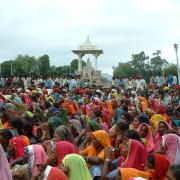Summary available (in English and Spanish)
Thank you for joining War Resisters International and the New Tactics community for an online conversation on tactics for combating the militarisation of education, public spaces, vulnerable communities, entertainment and culture, from June 10 to 14, 2013.
Governments and other military actors around the world target youth and other vulnerable communities for military recruitment and service. Simultaneously, the militarisation of public spheres such as space and culture promote the acceptance of the prioritising of military capability and approaches. In response, human rights organizations and other campaigners have developed innovative ways of combating increasing militarisation. Practitioners are exploring ways to utilize international mechanisms to support the right to conscientious objection - one of the most visible ways of rejecting militarisation. Other practitioners are working to stop the disproportionate targeting of vulnerable communities for military recruitment, such as youth and people of lower income, by raising the awareness of cultural recruitment and creating “military-free schools”.


 When the Canadian government refused to make public draft documents in their negotiations over the Free Trade Agreement of the Americas, Operation SalAMI organized hundreds of citizens to show up holding “Search and Rescue Warrants” for the release of these draft documents. The government responded by arresting one hundred citizens for requesting their right to information.
When the Canadian government refused to make public draft documents in their negotiations over the Free Trade Agreement of the Americas, Operation SalAMI organized hundreds of citizens to show up holding “Search and Rescue Warrants” for the release of these draft documents. The government responded by arresting one hundred citizens for requesting their right to information. Mazdoor Kisan Shakti Sangathan (MKSS) has been deeply involved in a collective process which has shaped and influenced the Campaign for the Right to Information in India. MKSS makes the case that without access to information and transparency there can be no genuine participation from all members of society, particularly the poor, in democracy.
Mazdoor Kisan Shakti Sangathan (MKSS) has been deeply involved in a collective process which has shaped and influenced the Campaign for the Right to Information in India. MKSS makes the case that without access to information and transparency there can be no genuine participation from all members of society, particularly the poor, in democracy.